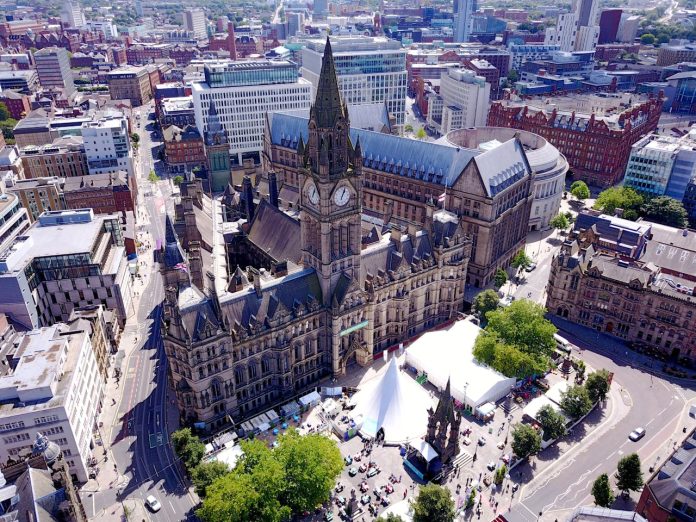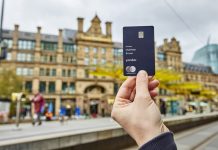Manchester is at the heart of a digital revolution, transforming into one of Europe’s fastest-growing technology cities. This vibrant transformation is powered by a robust and resilient digital sector that includes cutting-edge advancements in AI, eCommerce, and digital marketing.
The Manchester Digital Strategy paves the way for the city to become a leading digital hub, emphasizing the role of innovation, social media engagement, and software development in fostering a thriving business environment.
As you delve deeper into Manchester’s digital landscape, you’ll discover how traditional retail is adapting to the rapid advances in mobile technology and artificial intelligence, boosting the city’s eCommerce strength.
The Rise of Digital in Manchester’s Retail Sector
Manchester’s transformation into the UK’s leading tech city outside of London is not just a title; it’s a movement powered by a £5 billion digital ecosystem. This ecosystem is home to over 10,000 digital and tech businesses, fostering an environment ripe for innovation and collaboration.
Moreover, Manchester has established itself as a hub for e-commerce and retail tech companies, fostering the growth of homegrown firms like Missguided and The Hut Group. This burgeoning sector is bolstered by the city’s expertise in complementary industries such as FinTech, AI and data, and cyber security.
AI and big data technologies are spearheading technological integration in Manchester, with 43% of adopters implementing two or more digital technologies. This proactive approach highlights the city’s emphasis on harnessing the power of AI and big data to drive innovation and gain valuable insights for business optimization and growth.
Impact on Traditional Retail
As the Manchester digital revolution continues to reshape the retail landscape, traditional brick-and-mortar stores face a pivotal moment. The shift towards e-commerce and digital brands with an exclusive online presence has led to an increase in physical store closures.
This trend not only changes the way we shop but also amplifies the digital divide, leaving some consumers and retailers struggling to keep up.
The Impact of e-Commerce on Traditional Retail Stores
E-commerce has undoubtedly disrupted the traditional retail landscape in Manchester. With the convenience of online shopping and the abundance of options available at the click of a button, consumers have shifted their preferences towards online retailers.
This shift has led to a decline in foot traffic and sales for traditional brick-and-mortar stores. Many retailers have struggled to keep up with the changing consumer behavior and have been forced to shut down their physical stores. However, this digital transformation has also opened up new opportunities for retailers to adapt and thrive. For example, Benchmark Email recommends that retailers offer in-store pickup and returns for online orders.
The Rise of Online Marketplaces and Their Effect on Local Retailers
Online marketplaces, such as Amazon and eBay, have played a significant role in the digital transformation of Manchester’s retail industry. These platforms provide a vast online marketplace where retailers can showcase their products to a global audience.
For local retailers in Manchester, this presents an opportunity to reach a wider customer base beyond the confines of their physical stores. However, it also poses challenges, as competition on these platforms is fierce. Retailers need to optimize their online presence, ensure competitive pricing, and provide exceptional customer service to stand out among the crowd.
The Role of Social Media in Driving Digital Transformation in Manchester
Social media has become an integral part of our daily lives, and its impact on the retail industry in Manchester cannot be overlooked. Platforms like Facebook, Instagram, and Twitter have transformed the way retailers connect and engage with their customers.
Social media allows retailers to build a strong online presence, communicate their brand message, and create personalized experiences for their customers. It enables retailers to target specific demographics, run targeted ad campaigns, and gather valuable customer insights. Manchester’s retailers are using the power of social media to drive digital transformation and stay relevant in the ever-evolving retail landscape.
The Importance of Mobile Technology
In the digital age, mobile technology has become an essential tool for retailers to enhance the customer experience and streamline their operations. Mobile apps and responsive websites enable customers to browse and purchase products on the go, providing them with the convenience and flexibility they desire.
Retailers in Manchester are embracing mobile technology to offer personalized recommendations, enable mobile payments, and provide seamless integration between their online and offline channels. By embracing mobile technology, retailers can bridge the gap between the physical and digital worlds, creating a unified and immersive shopping experience for their customers.
Successful Digital Transformation Cases in Manchester’s Retail Sector
Several retailers in Manchester have successfully embraced digital transformation to stay competitive in the evolving retail landscape.
One such example is XYZ Clothing, a local fashion retailer that launched an e-commerce website, established a strong presence on social media platforms and collaborated with online marketplaces. Thanks to digital technologies, XYZ Clothing expanded its customer base, increased sales, and enhanced the overall shopping experience.
Another case study is ABC Electronics, which invested in mobile technology and created a mobile app that allowed customers to browse, compare, and purchase products seamlessly. The app’s intuitive interface allowed users to explore detailed product information, compare features, read reviews, and make informed purchase decisions, all within a single platform.
The Impact of Retail Bingo Closures in Manchester
Another industry that has drastically changed its operations from retail to online in Manchester is the bingo industry. The closure of retail bingo establishments in Manchester has had a significant impact on both the entertainment landscape and the local community.
The closure of these venues has led to a loss of a cultural and nostalgic experience for many residents, particularly for older generations who have cherished memories of bingo nights as a form of leisure and social interaction.
The closures have also resulted in the loss of employment opportunities for workers in the retail bingo industry, including bingo callers, staff, and management. For example, Life In Sale recently shared that Mecca Bingo closed after 48 years, resulting in local unemployment rates and affecting the livelihoods of individuals who relied on these jobs.
However, amidst these changes, the rise of online bingo has presented various benefits for enthusiasts and the gaming industry.
Online bingo offers unparalleled convenience, allowing players to enjoy their favorite game from the comfort of their homes. This accessibility is particularly beneficial for individuals who may have difficulty accessing traditional retail bingo venues due to mobility issues or distance.
Furthermore, online bingo sites frequently offer enticing promotions, bonuses, and loyalty programs, providing players with additional value and incentives to participate in online gaming activities. According to SlotsWise, 57% of online bingo players prefer the no wagering bingo promotions due to the many advantages they offer.
In Conclusion
Manchester’s digital transformation is not just about adopting new technologies; it is about reshaping the city’s retail landscape into a vibrant, inclusive, and sustainable ecosystem. Through the integration of AI, eCommerce, and cybersecurity, alongside a focus on creating omnichannel experiences, Manchester is leading the charge towards a future where digital inclusion and economic prosperity go hand in hand.
This digital revolution, fueled by a £5 billion digital ecosystem and over 10,000 digital and tech businesses, underscores the city’s commitment to innovation and collaboration, ensuring a competitive edge in the global digital economy.
As we look forward, the challenges and opportunities presented by Manchester’s digital transformation underscore the importance of fostering a skilled workforce, enhancing digital accessibility, and prioritizing environmental sustainability.
By continuing to leverage digital innovations in service design, eCommerce, and cybersecurity, Manchester sets a forward-thinking example for cities worldwide. The city’s journey towards becoming a leading smart city by 2026 reflects a well-rounded approach to digital advancement, emphasizing inclusivity, resilience, and balanced growth that aligns with the needs of both its people and the planet.







